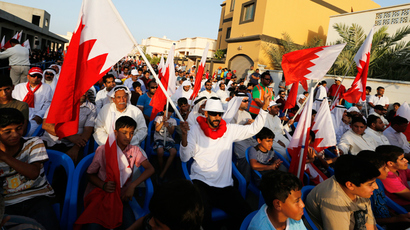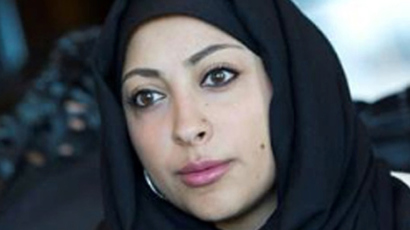Anti-government protests rock Bahrain amidst tight security
Police have used tear gas and birdshot to contain long-planned protests in the Gulf State of Bahrain. The country’s Shi’ite majority is demanding a greater say in the political decisions of the Sunni-ruled country.
The long-planned protests mark two-and-a-half years since the unsuccessful uprising in the oil-rich state during which protesters called for the abdication of King Hamad, who has been in power since 1999.
Despite a ban on public demonstrations, throngs walked through
capital Manama shouting "Democracy! Democracy!", as police
erected barriers and checkpoints through many of the main
streets.
قوات المرتزقة التابعة للنظام الخليفي تغرق شارع البديع بالغازات السامة !! #تمرد_البحرينpic.twitter.com/jvU5amRFt7
— Sajjad #FreeSafy (@ilsayed) August 14, 2013
In defiance government threats to use force against what they claim to be foreign-backed "riots" many in the villages outside Manama protested by organizing sit-ins outside their houses.
Masses sit -in near homes in all areas of #Bahrain@feb14media@hrw@amnesty@yourAnonNewspic.twitter.com/NSE4GzPopL
— yousif omran jassim (@yousifomranjass) August 14, 2013
#Bahrain: Security forces suppressed citizens sitting near their homes in the village of Aldaih pic.twitter.com/ceE6L1ipij
— Human Rights Bahrain (@byshr) August 14, 2013
In the village of Shakoora about 300 demonstrators clashed with a police cordon over a specially-built barbed wire fence, penning them in.
In other Shi'ite settlements, the protests remained peaceful, and no casualties have been reported throughout the day.
According to the main opposition group, around 60 rallies were
held in 40 locations to push the Sunni Muslim ruling family for
more democracy in the Shi'ite-majority nation of 1.25 million
people.
Security forces turned up in the al-Seef district of Manama after
activists used Twitter to call for demonstrators to gather there,
in defiance of a strict ban on protests in the capital.
The Bahrain Centre for Human Rights said at least 10 people had
suffered teargas inhalation or were wounded by birdshot. A
spokesman for the main opposition Al Wefaq Society said two
people were in a serious condition.
"Despite the campaign of intimidation and surrounding villages
with barbed wire, thousands of people turned up for the
protests," Sayed Yousif al-Muhafda, of the Bahrain Centre for
Human Rights, told Reuters.
#BCHR 10 arrests including women/children, 10's of injuries frm pellets/tear gas, 10s of areas attacked by security forces #Bahrain#Aug14
— S.Yousif Almuhafda (@SAIDYOUSIF) August 14, 2013
The Interior Ministry said that an Asian worker had been injured
by a firebomb while trying to open a road blocked by protesters
in a village south of Manama. It described the use of firebombs
and road blocks as "terrorism," for which new laws passed this
month introduce tough penalties, including depriving perpetrators
of Bahraini citizenship.
Police also arrested a driver and other occupants of her car,
saying she had tried to run over a policeman at a road block.
Unlike in Egypt, where protesters against the recently ousted
Muslim Brotherhood government were backed by the military,
Bahrain's security forces remain loyal to the government.
Authorities warned they would "forcefully confront'' any
large demonstrations. Concrete barriers lined major streets in
the capital, Manama, and security checkpoints surrounded by
barbed wire guarded roads leading to the city from majority
Shiite neighborhoods.
"Based on what we are following in the field, the government
violence against protesters is inevitable,'' a spokesman for
the group organizing the rallies, Hussain Yousif, told AP.
"But we need to go ahead and show the world and the government
that the Bahraini people have the right to express their
political demands,'' he added.
#المالكية جانب من إفتراش الأطفال الأراضي أمام منازلهم بكل سلمية مُعلنين تمرّدهم على الظلم والطغيان #تمرد_البحرينpic.twitter.com/InqKgDxrQv
— Feb14Media Network (@Feb14Media) August 14, 2013
While protesters insist they'll remain peaceful and defiant,
there have been attacks in recent weeks around Bahrain, including
some from bombs made with natural gas canisters.
RT @SAIDYOUSIF: #bahrain protest in aldair #aug14pic.twitter.com/3eqdcC6e6l
— Maryam Alkhawaja (@MARYAMALKHAWAJA) August 14, 2013
Citing the fear of violence, the US temporarily closed its
embassy in Bahrain on Wednesday after activists called on people
to meet nearby. The kingdom is home to the US Navy's 5th Fleet,
and is the Pentagon's main base to counter Iran's expanding
military presence in the Gulf and protect oil shipping lanes
through the Gulf of Hormuz.
The protests have been organized by the Tamarod Bahrain campaign, which features several opposition groups and has adopted the name of Egypt's Tamarod movement. They are expected to stage nonviolent protests in nine areas of the country, with the largest expected in Manama. Wednesday coincides with the 42nd anniversary of Bahrain's independence from Britain. It also marks 2 1/2 years since the current wave of unrest started.

"The government will forcefully confront the suspicious calls
to violate law and order and those who stand behind them through
decisive measures,'' Prime Minister Prince Khalifa bin Salman
Al Khalifa told the official Bahrain News Agency on Monday.
Meanwhile, Bahrain's largest opposition group, the Islamist al
Wefaq Society, said it was not planning to join the protesters,
but made it clear it supported the right to hold peaceful
demonstrations.
RT correspondent Lucy Kafanov says that the Bahrain government has dealt with all protests firmly in the country, since the beginning of the Arab Spring. "Bahrain has been rocked by political unrest since 2011. For the past two years the majority Shiite opposition has been pushing for democratic reforms, but those demands have been met with an iron fist," Kafanov said.
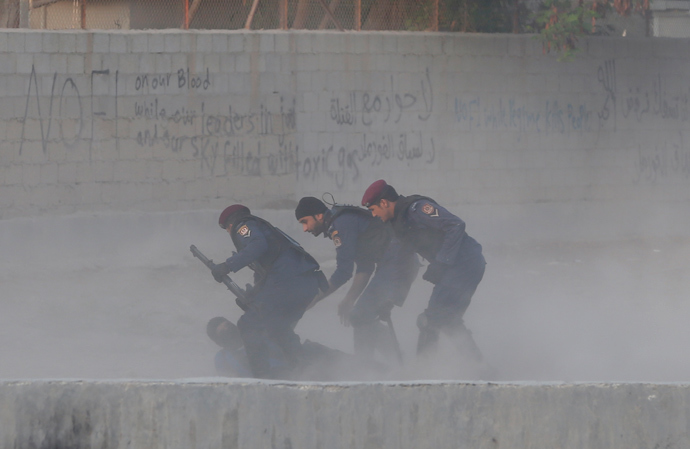
The opposition is demanding a constitutional monarchy with a
government chosen from within a democratically elected
parliament. It claims there is discrimination against majority
Shiites in areas such as employment and public services. The
government has denied any discrimination.
"There have been lots of violations in Bahrain, but unfortunately there's rarely anything in the Western media regarding all the violations. Torture is a daily act," Jalal Fairooz, former opposition MP from the Wefaq Party, told RT.
"Over the past week three major human groups, including Amnesty International, have issued a very strong urging for the UK government and other foreign governments to stop supporting the dictator and try to enforce respect of human rights,” Fairooz said. “But unfortunately the money and petrodollars talk louder than principles in the West.”
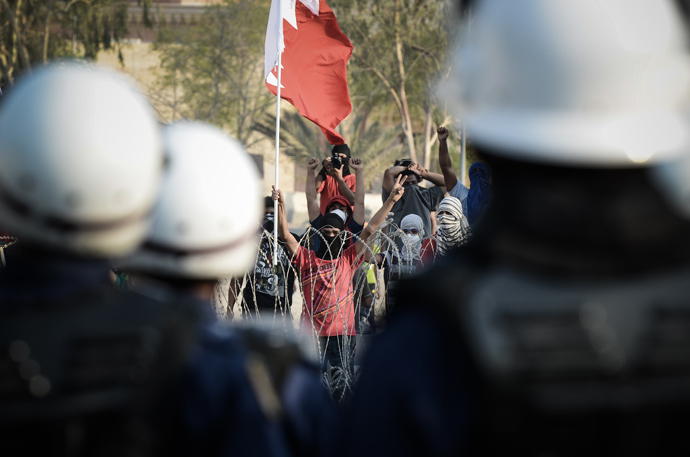
While there is no clear epicenter of revolt in Bahrain's uprising
history, like Egypt's Tahrir Square, the capital's Pearl Square
was cleared by police raids and sealed off from the public in the
early weeks of the unrest. The organizers of the nationwide
protests have called instead on Bahrain residents to flood the
streets. The Tamarod campaign leaders have urged workers to join
in a general strike and for shop owners to close their
businesses. The Bahrain Chamber of Commerce and Industry has
called on workers and business owners to ignore the protests.
Clashes have calmed down in recent months after the ruling family introduced some reforms, including giving the elected parliament more oversight powers and promising deeper investigations into alleged abuses by security forces. Many Shiites have dismissed the reforms as window dressing, however, saying that the monarchy is still in control of all key decision-making.
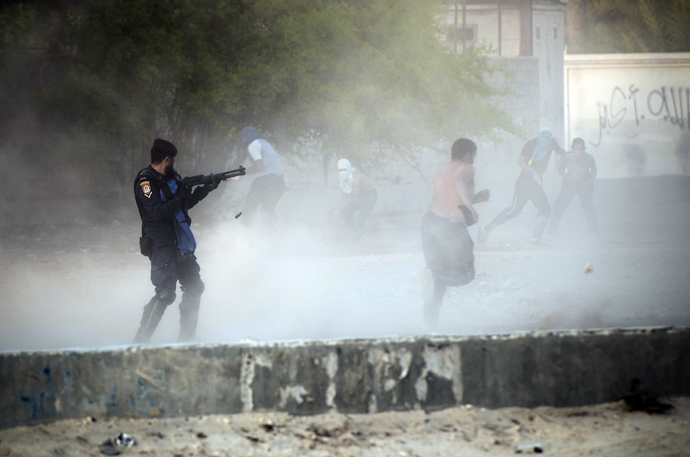
Bahrain's parliament has passed strict new laws to curb
opposition activists, including banning protests in the capital
and giving authorities the right to remove citizenship from those
convicted of violence.
Courts also have jailed prominent opposition figures and others,
including some with alleged links to Iranian-backed groups such
as Lebanon's Hezbollah. Bahrain and other Gulf states claim
that Iran, a majority Shiite country, has a hand in the protests.
Iran denies the claim.
Joe Stork, deputy director of Human Rights Watch's Middle East
and North Africa office, said Bahrain should allow the protests
to take place.
"The fact that some protesters perpetrate acts of violence in
some demonstrations does not justify a blanket ban on
demonstrations and protests in the capital city,'' Stork
said. "Bahrain's total ban on protests clearly violates the
right of citizens and residents to come together to raise
political demands peacefully.''













